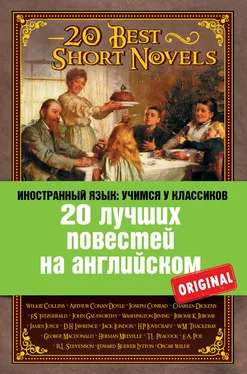So Sir Wilfrid of Ivanhoe became almost as tired of England as his royal master Richard was, (who always quitted the country when he had squeezed from his loyal nobles, commons, clergy, and Jews, all the money which he could get,) and when the lionhearted Prince began to make war against the French King, in Normandy [754]and Guienne [755], Sir Wilfrid pined like a true servant to be in company of the good champion, alongside of whom he had shivered so many lances, and dealt such woundy blows of sword and battle-axe on the plains of Jaffa [756]or the breaches of Acre [757]. Travellers were welcome at Rotherwood that brought news from the camp of the good King: and I warrant me that the knight listened with all his might when Father Drono, the chaplain, read in the St. James’s Chronykyll (which was the paper of news he of Ivanhoe took in) of ‘another glorious triumph’ – ‘Defeat of the French near Blois [758]’ – ‘Splendid victory at Epte [759], and narrow escape of the French King:’ the which deeds of arms the learned scribes had to narrate.
However such tales might excite him during the reading, they left the Knight of Ivanhoe only the more melancholy after listening: and the more moody as he sat in his great hall silently draining his Gascony [760]wine. Silently sat he and looked at his coats-of-mail hanging vacant on the wall, his banner covered with spider-webs, and his sword and axe rusting there. ‘Ah, dear axe,’ sighed he (into his drinking-horn) – ‘ah, gentle steel! that was a merry time when I sent thee crashing into the pate of the Emir Abdul Melik as he rode on the right of Saladin [761]. Ah, my sword, my dainty headsman? my sweet split-rib? my razor of infidel beards! is the rust to eat thine edge off, and am I never more to wield thee in battle? What is the use of a shield on a wall, or a lance that has a cobweb for a pennon? O Richard, my good king, would I could bear once more thy voice in the front of the onset! Bones of Brian the Templar [762]? would ye could rise from your grave at Templestowe, and that we might break another spear for honor and – and—’
‘And Rebecca ,’ he would have said; but the knight paused here in rather a guilty, panic: and her Royal Highness the Princess Rowena (as she chose to style herself at home) looked so hard at him out of her china-blue eyes, that Sir Wilfrid felt as if she was reading his thoughts, and was fain to drop his own eyes into his flagon.
In a word, his life was intolerable. The dinner hour of the twelfth century, it is known, was very early; in fact, people dined at ten o’clock in the morning: and after dinner Rowena sat mum under her canopy, embroidered with the arms of Edward the Confessor [763], working with her maidens at the most hideous pieces of tapestry, representing the tortures and martyrdoms of her favorite saints, and not allowing a soul to speak above his breath, except when she chose to cry out in her own shrill voice when a handmaid made a wrong stitch, or let fall a ball of worsted. It was a dreary life. Wamba, we have said, never ventured to crack a joke, save in a whisper, when he was ten miles from home; and then Sir Wilfrid Ivanhoe was too weary and blue-devilled to laugh; but hunted in silence, moodily bringing down deer and wild-boar with shaft and quarrel.
Then he besought Robin of Huntingdon [764], the jolly outlaw, nathless, to join him, and go to the help of their fair sire King Richard, with a score or two of lances. But the Earl of Huntingdon was a very different character from Robin Hood the forester. There was no more conscientious magistrate in all the county than his lordship: he was never known to miss church or quarter-sessions; he was the strictest game-proprietor in all the Riding, and sent scores of poachers to Botany Bay [765]. ‘A man who has a stake in the country, my good Sir Wilfrid,’ Lord Huntingdon said, with rather a patronizing air, (his lordship had grown immensely fat since the King had taken him into grace, and required a horse as strong as an elephant to mount him) ‘a man with a stake in the country ought to stay in the country. Property has its duties as well as its privileges, and a person of my rank is bound to live on the land from which he gets his living.’
‘Amen!’ sang out the Reverend Tuck, his lordship’s domestic chaplain, who had also grown as sleek as the Abbot of Jorvaulx [766], who was as prim as a lady in his dress, wore bergamot in his handkerchief, and had his poll shaved and his beard curled every day. And so sanctified was his Reverence grown, that he thought it was a shame to kill the pretty deer, (though he ate of them still hugely, both in pasties and with French beans and currant-jelly,) and being shown a quarter-staff upon a certain occasion, handled it curiously, and asked what that ugly great stick was?’
Lady Huntingdon, late Maid Marian, had still some of her old fun and spirits, and poor Ivanhoe begged and prayed that she would come and stay at Rotherwood occasionally, and egayer the general dulness of that castle. But her ladyship said that Rowena gave herself such airs, and bored her so intolerably with stories of King Edward the Confessor, that she preferred any place rather than Rotherwood, which was as dull as if it had been at the top of Mount Athos.
The only person who visited it was Athelstane. ‘His Royal Highness the Prince’ Rowena of course called him, whom the lady received with royal honors. She had the guns fired, and the footmen turned out with presented arms when he arrived; helped him to all Ivanhoe’s favorite cuts of the mutton or the turkey, and forced her poor husband to light him to the state bedroom, walking backwards, holding a pair of wax-candles. At this hour of bedtime the Thane used to be in such a condition, that he saw two pair of candles and two Ivanhoes reeling before him. Let us hope it was not Ivanhoe that was reeling, but only his kinsman’s brains muddled with the quantities of drink which it was his daily custom to consume. Rowena said it was the crack which the wicked Bois Guilbert, ‘the Jewess’s other lover, Wilfrid my dear,’ gave him on his royal skull, which caused the Prince to be disturbed so easily; but added, that drinking became a person of royal blood, and was but one of the duties of his station.
Sir Wilfrid of Ivanhoe saw it would be of no avail to ask this man to bear him company on his projected tour abroad; but still he himself was every day more and more bent upon going and he long cast about for some means of breaking to his Rowena his firm resolution to join the King. He thought she would certainly fall ill if he communicated the news too abruptly to her: he would pretend a journey to York to attend a grand jury; then a call to London on law business or to buy stock; then he would slip over to Calais [767]by the packet, by degrees as it were; and so be with the King before his wife knew that he was out of sight of Westminster Hall [768].
Suppose your honor says you are going as your honor would say Boo! to a goose, plump, short, and to the point,’ said Wamba the Jester – who was Sir Wilfrid’s chief counselor and attendant – ‘depend on’t her Highness would bear the news like a Christian woman.’
‘Tush, malapert! I will give thee the strap,’ said Sir Wilfrid, in a fine tone of high-tragedy indignation. ‘Thou knowest not the delicacy of the nerves of high-born ladies. An she faint not, write me down Hollander.’
‘I will wager my bauble against an Irish billet of exchange that she will let your honor go off readily: that is, if you press not the matter too strongly,’ Wamba answered, knowingly. And this Ivanhoe found to his discomfiture: for one morning at breakfast, adopting a d é gag é air, as he sipped his tea, he said, ‘My love, I was thinking of going over to pay his Majesty a visit in Normandy.’ Upon which, laying down her muffin, (which, since the royal Alfred baked those cakes, had been the chosen breakfast cate of noble Anglo-Saxons, and which a kneeling page tendered to her on a salver, chased by the Florentine, Benvenuto Cellini [769],) – ‘When do you think of going, Wilfrid my dear?’ the lady said; and the moment the tea-things were removed, and the tables and their trestles put away, she set about mending his linen, and getting ready his carpet-bag.
Читать дальше
Конец ознакомительного отрывка
Купить книгу












